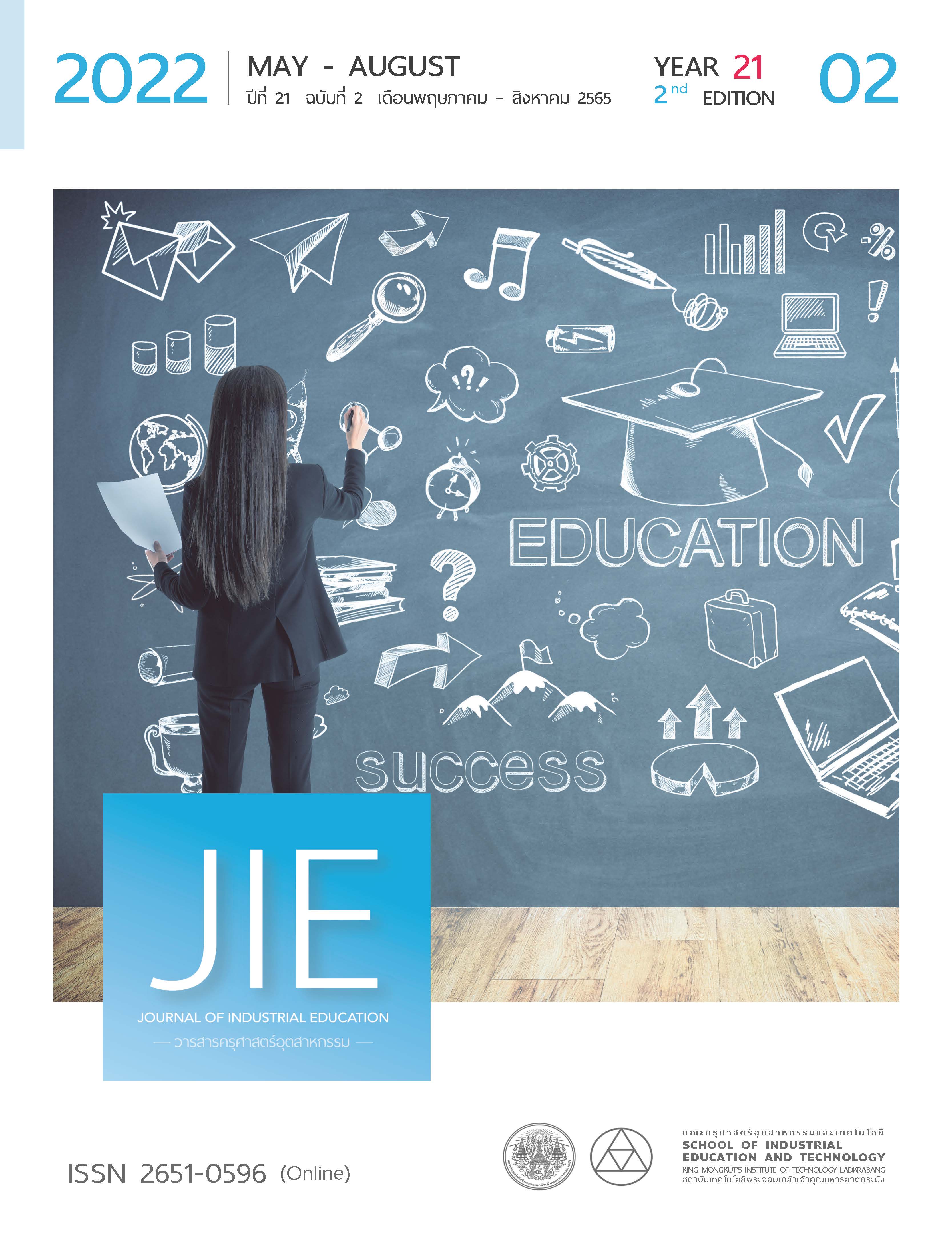BLENDED LEARNING ON INTEGRATED FARMING FOR 3rd YEAR VOCATIONAL CERTIFICATE STUDENTS AT KANCHANABURI AGRICULTURE AND TECHNOLOGY COLLEGE
Keywords:
Blended learning, Online classroom, Learning achievements, Integrated farming, Agricultural educationAbstract
This article presents a Blended learning on Integrated Farming for 3rd Year Vocational Certificate Students at Kanchanaburi Agriculture and Technology College. The purposes of this research were to study and development of Blended learning and to compare pretest and posttest achievement score of blended learning. The research samples were vocational certificate students at Kanchanaburi Agriculture and Technology College, majoring in Agriculture. The 20 students enrolled in 1st semester of academic year 2021 on integrated farming subject obtained by Cluster random sampling. The tools used in this research were 1) Five Blended learning management plans, which were revised according to the opinions of three experts who checked the consistency between content and learning objectives. The assessment quality of learning management plan had high average criteria ( = 4.41, SD = 0.54), 2) An evaluation of online Classroom media with Google Classroom that was assessed by three experts for improving
the effectiveness that online Classroom media. Applying to New Theory Agriculture and Philosophy of
the Sufficiency Economy efficiency of E1/E2 81.70/86.67 which met define performance criteria, and 3) This test form composed 30-item (Multiple-choice Items), IOC (Index of Item objective congruency) content validity 0.80-1.00, difficulty 0.40-0.70, discrimination 0.20-0.80, and reliability value 0.80 when applied in a Blended teaching and learning management. The ratio Blended learning on integrated farming was 80:20. The results of the study were that Blended learning on integrated farming for 3rd year vocational certificate students at Kanchanaburi Agriculture and Technology College on the application of Students on Integrated Farming with New Theory Agriculture and Philosophy of the Sufficiency Economy post-test achievements are higher than pre-test that Blended learning management with statistical significance the .05 level that should be encouraged learners to interested in learning as well.
References
Allen, I. E., & Seaman, J. (2010). Blended learning. https://goo.gl/DRmsJ1
Atchanapanya, N. (2020). When the Covid-19 virus is transforming the world's education system.
https://www.eef.or.th/30577 (in Thai)
Carman, J. M. (2005). Blended learning design: Five key ingredients. https://www.it.iitb.ac.in/~s1000brains/rswork/
dokuwiki/media/5_ingredientsofblended_learning_design.pdf
Choawrua, K. (2020). Development of blended learning model by using problem based learning for enhancing problem solving ability of high school students [Master’s thesis]. Mahasarakham University. (in Thai)
Carman, J. M. (2005). Blended learning design: FiveKey ingredients. https://goo.gl/Eoyztf
Graham, C. R. (2005). Blended learning systems: Definition, current trends, and future directions. Pfeiffer.
Jaitham, P. (2015). Blended learning: Case study of Siriwangwittayakarn School [Master’s thesis]. Mahanakorn University of Technology. (in Thai)
Jinjo, S. (2007). Development of a blended teaching and learning model in computer programming program 1 business computing branch [Master’s thesis]. King Mongkut's University of Technology North. (in Thai)
Johnson, D., & Johnson, R. (2015). Cooperative Learning: Improving university instruction by basing practice on validated theory. Journal on Excellence in College Teaching, 25(4), 85–118.
Kaewurai, R. (2007). Blended learning. http://shorturl.at/mryX8
Khemjirat, S. (1999). Some of the variables related to the academic achievement of diploma students business administration Rajamangala Institute of Technology Bangkok Commerce District [Master’s thesis]. Srinakharinwirot University. (in Thai)
Ministry of Education. (1999). National education act 1999. Siam Sport Syndicate. (in Thai)
Nilhame, P., Boonphak, K., & Klinhom, L. (2013). The computer-assisted instruction internet on data communication and computer networking for Mathayomsuksa 4 student Protpittayapayat School. Journal of Industrial Education, 12(1), 145-151. (in Thai)
Nilsook, P., & Wannapiroon, P. (2014). Blended management learning: Blended ratio. Journal of Technical Education Development, 25(85), 31-36. (in Thai)
Office of the Vocational Education Commission. (2019). Vocational certificate program B.E. 2562 in agriculture. Office of the Vocational Education Commission. (in Thai)
Panichphan, K. (2000). Development of a measuring instrument for industrial air conditioning performance [Master’s thesis]. King Mongkut's Institute of Technology. (in Thai)
Phungbua, S. (2019). Development of online lesson on internet subject with Google Classroom application for students grade 7 [Master’s thesis]. Burapha University. (in Thai)
Ritjarun, P. (2002). Principles of educational measurement and evaluation (2nd ed.). House of Kermist. (in Thai)
Saeng, A., & Wirotwan, C. (2015). The application of Google Classroom for teaching and learning management systems analysis and design of students of the Faculty of Information Technology [Master’s thesis]. North University. (in Thai)
Sethabutr, E. (2015). Creation of classes for teachers. https://www.eef.or.th/30577 (in Thai)
Singsungnoen, K., & Jeerangsuwan, B. (2015). Google for education and the reform of Thai education. Journal of Educational Techniques Development, 28(96), 14-20.
Thienthong, M. (2005). Design and development of computer courseware for computer lessons (2nd ed.). King Mongkut's Institute of Technology North. (in Thai)
Thongnet, K. (2014). The development of learning model of blended learning online [Master’s thesis]. Rajabhat Maha Sarakham University. (in Thai)
Uphet, A. (2017). Effects of collaborative, blended learning on the ability to work in academic groups careers and technology 4 of Mathayomsuksa 5 students [Master’s thesis]. Silpakorn University. (in Thai)
Wongchinda, W. (2015). The effect of blended learning on innovation and education information technology. In P. Narongwit & S. Phongpinyoopas (Eds.), The 2nd Kamphaeng Phet Rajabhat University Student National Conference (pp. 445 - 450). Research KPRU.
Downloads
Published
How to Cite
Issue
Section
License
Copyright (c) 2022 Journal of Industrial Education

This work is licensed under a Creative Commons Attribution-NonCommercial-NoDerivatives 4.0 International License.
"The opinions and contents including the words in papers are responsibility by the authors."
"ข้อคิดเห็น เนื้อหา รวมทั้งการใช้ภาษาในบทความถือเป็นความรับผิดชอบของผู้เขียน"



